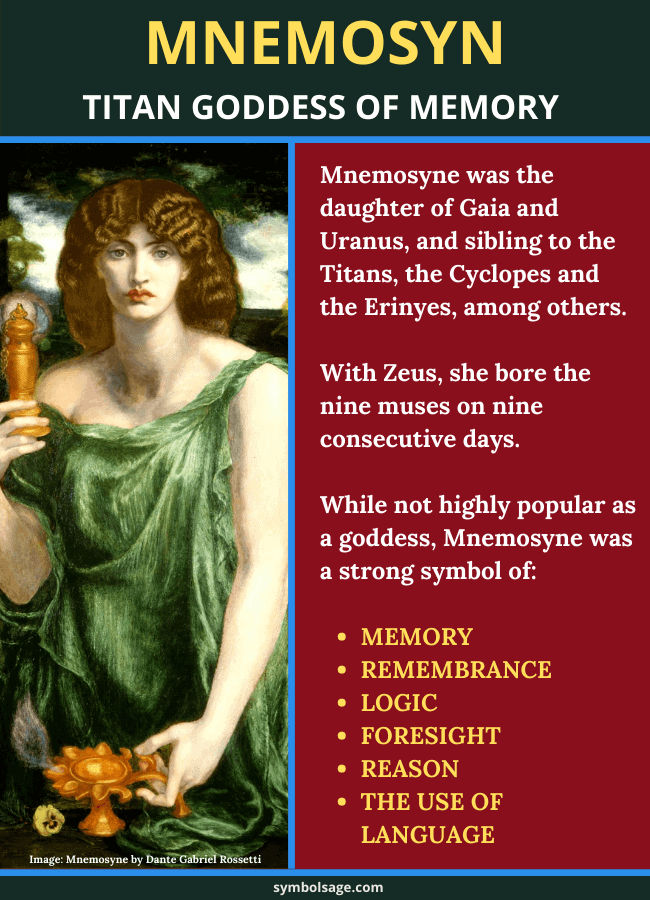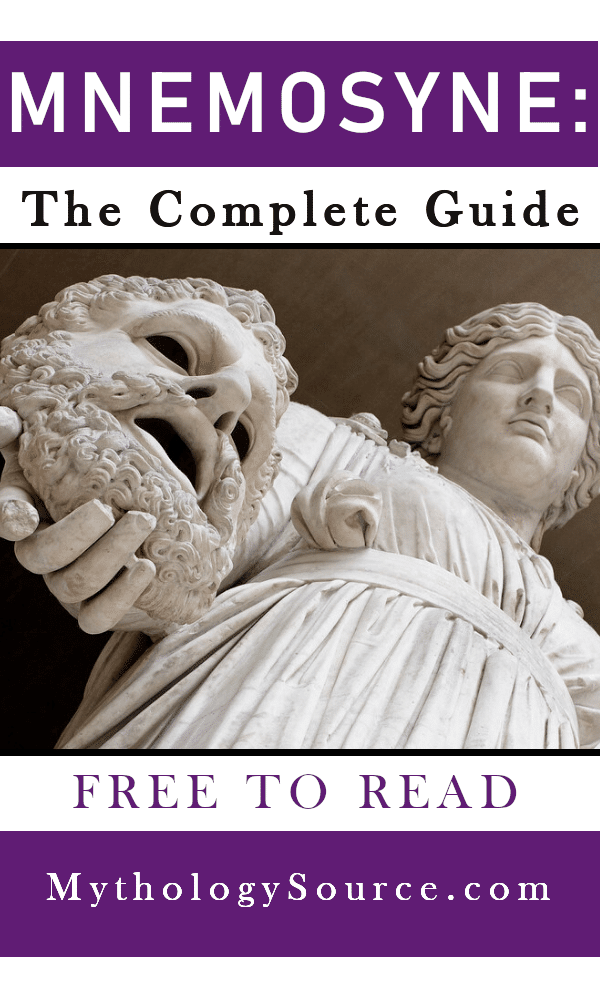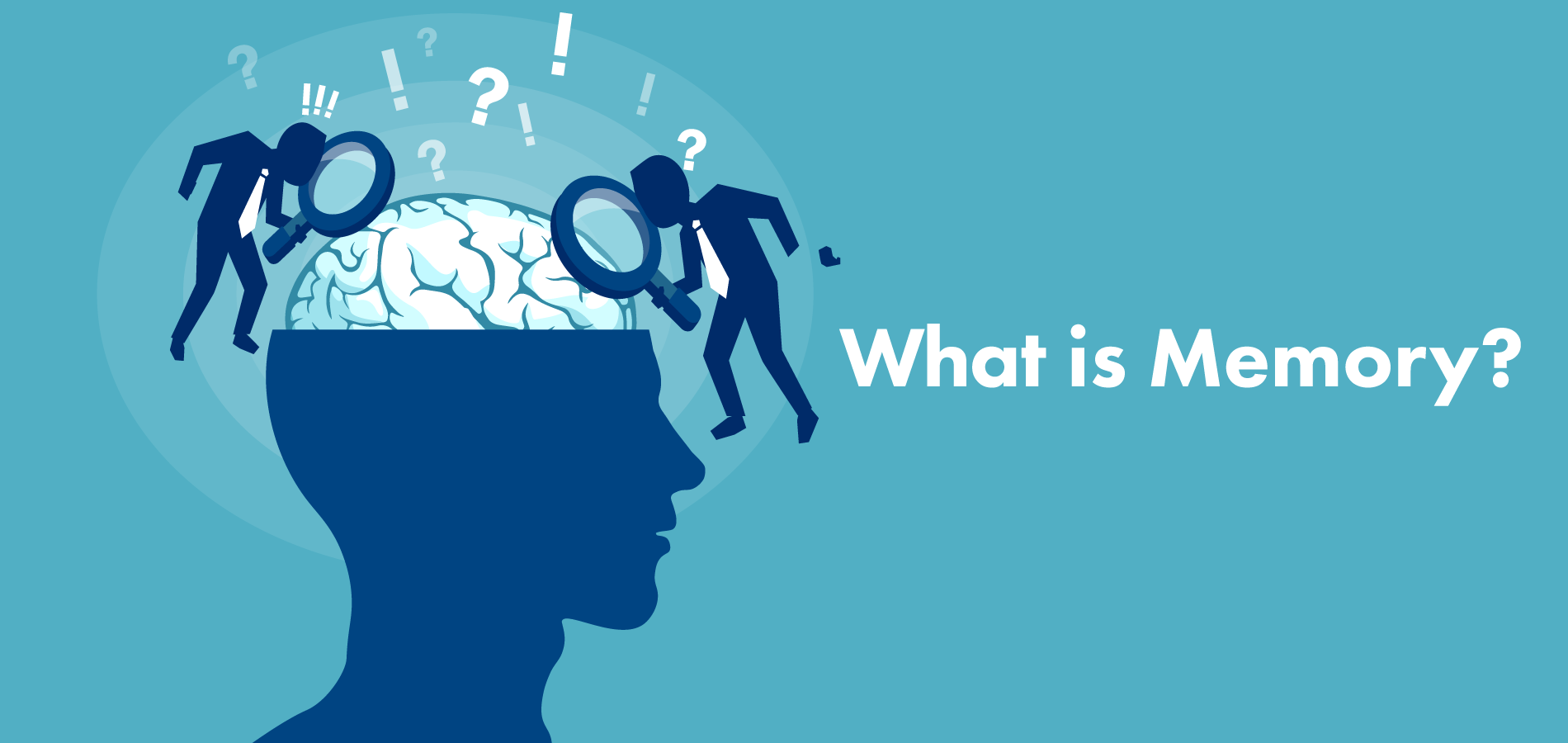Memory
Posted: Thu Nov 07, 2024 10:13 pm
Douglas Mercer
November 7 2024
We are immortal beings who are amnesiacs relative to our true nature. We are caught up in a dream world unaware of ourselves as creators of the fantasy. The goal is to get the participants to wake up from the dream to recall our rightful heritage and become supermen.
Always Remember
In Greek mythology and the ancient Greek Religion Memory played the overarching role; Mnemosyne was the goddess of memory and the mother of the Nine Muses as Zeus was their father. In the Greek Tradition Mnemosyne is one of those Ur or Primordial Gods called The Titans who were the twelve divine children of the goddess of the Earth Gaia and the god of the sky Uranus. The term Mnemosyne is from the same source as the word mnemonic that being the Greek word mneme (meme) which means remembrance or memory. In Hesiod’s Theogony, kings and poets receive their powers of authoritative speech from their possession of Mnemosyne and their special relationship with the Muses. Zeus, in the form of a mortal shepherd, slept together with Mnemosyne for nine consecutive nights, thus conceiving the nine Muses. Mnemosyne also presided over a pool in Hades a counterpart to the river Lethe, according to a series of 4th-century BC Greek funerary descriptions in dactylic.
Dead souls drank from Lethe so they would not remember their past lives when reincarnated. In Orphism the initiated were taught to instead drink from the Mnemosyne, the river of memory, which would stop the transmigration of souls. For to forget is not to learn and you have to undergo the lessons all over again; to remember is to learn and pass with flying colors.
The river Lethe is the river of forgetfulness, it runs straight through a cave called Hypnos, or sleep. Shakespeare speaks of one who forgets as being a fat rat on the wharf of Lethe.
Always Remember
Memory is a deep well
Memory is often understood as an informational processing system with explicit and implicit functioning that is made up of a sensory processors called short-term and long-term memory. The sensory processors allow information from the outside world to be sensed in the form of chemical and physical stimuli and attended to at various levels of focus and intent. What enters via the senses is stored flawlessly for future use if you can access it.
Anyone who tells you what the brain is has no idea what the brain is but we can describe its function: to record. Memories are stored according to a very simple filing system: by time and type. That is every recorded impression is stored as to the moment it is recorded and it is also stored according to the category of things it falls into. We speak of things being stored (past tense) and of what is in store (future tense). When any memory arises in awareness it brings all the associated or attendant memories in its wake or train and so they are closer to the limn or threshold; it does so for the connected memories both according to time and type.
Pick up any Introductory Psychology text book and Chapter One will be titled: Learning And Memory. This is of course redundant; learning is memory and memory is learning; if you forget you have learned nothing.
Music is the mainline to memory. When one listens to music it is as if a ribbon of memory were being processed which contains all the thoughts you have while listening. Listen to the same music again and all those memories from the strip will be flooded into your awareness or at least closer to the limn.
The brain has one flaw; for it to work you have to use it.
A mnemonic device or memory device is any learning technique that aids information retention or retrieval in the human memory, often by associating the information with something that is easier to remember. It makes use of elaborate encoding, retrieval cues and imagery as specific tools to encode information in a way that allows for efficient storage and retrieval. It aids original information in becoming associated with something more accessible or meaningful—which in turn provides better retention of the information.
In the ancient world rhetoricians devised memory systems in order that they could recall large amounts of information while giving declamations. These extempore and impromptu speeches were called rhapsodies, a cascade of words that a speaker would make up on his feet and in order to make the words go gracefully they needed some system whereby they could recall words at the right moment as if they were magnets flying to metal. The most famous system was that of a house or a large dwelling such as a mansion. The rhapsodist simply creates this house in his mind and he builds it continually, the rooms are sites where he stores things according to categories or associations. As he moves forward and accrues more information he adds floors and basements and annexes and wings to the home and perhaps an arch or a flying buttress or two, or a trap door if he chooses. The house is ever growing but the initial blueprint holds him in good stead and then whenever it is time for him to speak (or write) the words or concepts come flying back to him like magnets to metal and he can pour forth his words seamlessly and flawlessly.
The state-of-the-art memory system is not to picture a house but to use words/concepts as sites. But best of all is to have no system; and just focus on each event as it comes in with all your might and let it go (catch and release) the way old office theory said a secretary should touch each paper only one time and then put it in its proper spot in the file so it could be retrieved according to a preordained system.
Life: file
The human brain is a flawless recording device which has an infinite capacity for clearance. All the impressions that one has received once the brain is formed in the womb, whether they come from the external world or from imagination, are stored perfectly. Some people have bad memories but that is only because they have repressions of suppressions or blockages, that is they have not yet made it into the clear and opened up all the spaces of their mind. Their brains or minds are thus like dark dank hermitages where the light does not get in and musty old unread tomes sit on the shelf gathering dust and cobwebs and a fetid pall hangs all over the place.
But for one in the clear all memories are accessible and available and if one has learned to operate one’s brain correctly every memory has its place in the order of associations and categories and will come up to one when it is needed. Thus the brain has two flaws; perfect as it is one has to use it or it will not work; and it is tied to a mortal body. Once the physical brain begins to deteriorate via dementia or Alzheimers the fast back and forth of the words subsides; this is a kind of amnesia where one is sunk in darkness or Lethe a river which flow through cave called Hypnos, variously translated as sleep or death. What we call déjà vu is the experience of believing that one has been there before, and the tip of the tongue phenomena is tantalizing. All of these are temporary flaws in the system when it goes temporarily haywire in a kind of aphasic regression; for as the old English saying runs: when memory goes—forget about it.
Kierkegaard wrote an entire book about Repetition but repetition is regression; likewise Nietzsche wrote about the Eternal Return but that is regression as well. Going back to the old ways or the old times is nostalgia; but forward looking is always best, a nostalgia for the future. When writing one needs to go back to the past but only in order to bring the words into the future; it is temporary expedient necessitated by the need for communication; but just as no one can dip in the same river twice so one should not say something more than once. Writing it all down is a way to prefect one’s past and to surpass it; to remember who we were so we may become what we will be.
The Greeks believed that learning was recollection, the loss of forgetfulness; but to remember who we were is necessary but not sufficient; that is one must get the faculty together only to spring into the future; for it is a growing system where one new thought, one new idea, can transform it into another mode of being; not a return then, but a leave taking as after a long illness one is finally convalescent.
In The movie the German Doctor the character who plays Mengele tells his charge about what happens when blood is mixed: memory becomes impure; on the table he has a knife which reads: My Honor Is My Loyalty. He says that pure blood recalls what it was and what his people were, and this recollection is so that we may become who we are. The young girl who is his student asks him innocently who we were and he says in tones of gravity: sonnenmencshen. True enough as the say memory is the mother of the muses but it is also the daughter of time; pure blood and a pure memory are best but to recall the past perfectly is old hat by now; and what we are remembering is much better than anything dead and buried; what we recall by now is the future--which, as the English are wont to say, is a horse of another color. For remember for sure, always remember it, but remember that when memory really goes—forget about it. I see a ship in the harbor; I can and shall obey. It is speed leaving; and there shall be no warning.
I have seen the future and it lurks, as is said.
***
Notes:
The Greek for truth is aletheia, ie, not forgetting or no longer having unmindfulness. The river Lethe is the river of oblivion (a fat weed on the wharf of Lethe). In myth the Lethe flowed around the cave Hypnos or sleep where death lurked nearby.
I was experience what I later learned is called anamnesis—a Greek word meaning, literally, loss of forgetfulness. I remembered who I was and where I was—Phillip Dick, The Exegesis (1980)
The phrase “Is it live or is it memorex?” refers to series of advertisements for Memorex, a brand of audio recording tape, that aired in the 1970s.
If you don’t remember it it’s a lie—old English saying
November 7 2024
We are immortal beings who are amnesiacs relative to our true nature. We are caught up in a dream world unaware of ourselves as creators of the fantasy. The goal is to get the participants to wake up from the dream to recall our rightful heritage and become supermen.
Always Remember
In Greek mythology and the ancient Greek Religion Memory played the overarching role; Mnemosyne was the goddess of memory and the mother of the Nine Muses as Zeus was their father. In the Greek Tradition Mnemosyne is one of those Ur or Primordial Gods called The Titans who were the twelve divine children of the goddess of the Earth Gaia and the god of the sky Uranus. The term Mnemosyne is from the same source as the word mnemonic that being the Greek word mneme (meme) which means remembrance or memory. In Hesiod’s Theogony, kings and poets receive their powers of authoritative speech from their possession of Mnemosyne and their special relationship with the Muses. Zeus, in the form of a mortal shepherd, slept together with Mnemosyne for nine consecutive nights, thus conceiving the nine Muses. Mnemosyne also presided over a pool in Hades a counterpart to the river Lethe, according to a series of 4th-century BC Greek funerary descriptions in dactylic.
Dead souls drank from Lethe so they would not remember their past lives when reincarnated. In Orphism the initiated were taught to instead drink from the Mnemosyne, the river of memory, which would stop the transmigration of souls. For to forget is not to learn and you have to undergo the lessons all over again; to remember is to learn and pass with flying colors.
The river Lethe is the river of forgetfulness, it runs straight through a cave called Hypnos, or sleep. Shakespeare speaks of one who forgets as being a fat rat on the wharf of Lethe.
Always Remember
Memory is a deep well
Memory is often understood as an informational processing system with explicit and implicit functioning that is made up of a sensory processors called short-term and long-term memory. The sensory processors allow information from the outside world to be sensed in the form of chemical and physical stimuli and attended to at various levels of focus and intent. What enters via the senses is stored flawlessly for future use if you can access it.
Anyone who tells you what the brain is has no idea what the brain is but we can describe its function: to record. Memories are stored according to a very simple filing system: by time and type. That is every recorded impression is stored as to the moment it is recorded and it is also stored according to the category of things it falls into. We speak of things being stored (past tense) and of what is in store (future tense). When any memory arises in awareness it brings all the associated or attendant memories in its wake or train and so they are closer to the limn or threshold; it does so for the connected memories both according to time and type.
Pick up any Introductory Psychology text book and Chapter One will be titled: Learning And Memory. This is of course redundant; learning is memory and memory is learning; if you forget you have learned nothing.
Music is the mainline to memory. When one listens to music it is as if a ribbon of memory were being processed which contains all the thoughts you have while listening. Listen to the same music again and all those memories from the strip will be flooded into your awareness or at least closer to the limn.
The brain has one flaw; for it to work you have to use it.
A mnemonic device or memory device is any learning technique that aids information retention or retrieval in the human memory, often by associating the information with something that is easier to remember. It makes use of elaborate encoding, retrieval cues and imagery as specific tools to encode information in a way that allows for efficient storage and retrieval. It aids original information in becoming associated with something more accessible or meaningful—which in turn provides better retention of the information.
In the ancient world rhetoricians devised memory systems in order that they could recall large amounts of information while giving declamations. These extempore and impromptu speeches were called rhapsodies, a cascade of words that a speaker would make up on his feet and in order to make the words go gracefully they needed some system whereby they could recall words at the right moment as if they were magnets flying to metal. The most famous system was that of a house or a large dwelling such as a mansion. The rhapsodist simply creates this house in his mind and he builds it continually, the rooms are sites where he stores things according to categories or associations. As he moves forward and accrues more information he adds floors and basements and annexes and wings to the home and perhaps an arch or a flying buttress or two, or a trap door if he chooses. The house is ever growing but the initial blueprint holds him in good stead and then whenever it is time for him to speak (or write) the words or concepts come flying back to him like magnets to metal and he can pour forth his words seamlessly and flawlessly.
The state-of-the-art memory system is not to picture a house but to use words/concepts as sites. But best of all is to have no system; and just focus on each event as it comes in with all your might and let it go (catch and release) the way old office theory said a secretary should touch each paper only one time and then put it in its proper spot in the file so it could be retrieved according to a preordained system.
Life: file
The human brain is a flawless recording device which has an infinite capacity for clearance. All the impressions that one has received once the brain is formed in the womb, whether they come from the external world or from imagination, are stored perfectly. Some people have bad memories but that is only because they have repressions of suppressions or blockages, that is they have not yet made it into the clear and opened up all the spaces of their mind. Their brains or minds are thus like dark dank hermitages where the light does not get in and musty old unread tomes sit on the shelf gathering dust and cobwebs and a fetid pall hangs all over the place.
But for one in the clear all memories are accessible and available and if one has learned to operate one’s brain correctly every memory has its place in the order of associations and categories and will come up to one when it is needed. Thus the brain has two flaws; perfect as it is one has to use it or it will not work; and it is tied to a mortal body. Once the physical brain begins to deteriorate via dementia or Alzheimers the fast back and forth of the words subsides; this is a kind of amnesia where one is sunk in darkness or Lethe a river which flow through cave called Hypnos, variously translated as sleep or death. What we call déjà vu is the experience of believing that one has been there before, and the tip of the tongue phenomena is tantalizing. All of these are temporary flaws in the system when it goes temporarily haywire in a kind of aphasic regression; for as the old English saying runs: when memory goes—forget about it.
Kierkegaard wrote an entire book about Repetition but repetition is regression; likewise Nietzsche wrote about the Eternal Return but that is regression as well. Going back to the old ways or the old times is nostalgia; but forward looking is always best, a nostalgia for the future. When writing one needs to go back to the past but only in order to bring the words into the future; it is temporary expedient necessitated by the need for communication; but just as no one can dip in the same river twice so one should not say something more than once. Writing it all down is a way to prefect one’s past and to surpass it; to remember who we were so we may become what we will be.
The Greeks believed that learning was recollection, the loss of forgetfulness; but to remember who we were is necessary but not sufficient; that is one must get the faculty together only to spring into the future; for it is a growing system where one new thought, one new idea, can transform it into another mode of being; not a return then, but a leave taking as after a long illness one is finally convalescent.
In The movie the German Doctor the character who plays Mengele tells his charge about what happens when blood is mixed: memory becomes impure; on the table he has a knife which reads: My Honor Is My Loyalty. He says that pure blood recalls what it was and what his people were, and this recollection is so that we may become who we are. The young girl who is his student asks him innocently who we were and he says in tones of gravity: sonnenmencshen. True enough as the say memory is the mother of the muses but it is also the daughter of time; pure blood and a pure memory are best but to recall the past perfectly is old hat by now; and what we are remembering is much better than anything dead and buried; what we recall by now is the future--which, as the English are wont to say, is a horse of another color. For remember for sure, always remember it, but remember that when memory really goes—forget about it. I see a ship in the harbor; I can and shall obey. It is speed leaving; and there shall be no warning.
I have seen the future and it lurks, as is said.
***
Notes:
The Greek for truth is aletheia, ie, not forgetting or no longer having unmindfulness. The river Lethe is the river of oblivion (a fat weed on the wharf of Lethe). In myth the Lethe flowed around the cave Hypnos or sleep where death lurked nearby.
I was experience what I later learned is called anamnesis—a Greek word meaning, literally, loss of forgetfulness. I remembered who I was and where I was—Phillip Dick, The Exegesis (1980)
The phrase “Is it live or is it memorex?” refers to series of advertisements for Memorex, a brand of audio recording tape, that aired in the 1970s.
If you don’t remember it it’s a lie—old English saying







